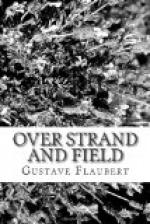How beautiful those terrific old dragons were, with their gaping, fire-spitting jaws, their scales, their serpent-tails, their bat-wings, their lion-claws, their equine bodies and fantastic heads! And the knight who overpowered them was a wonderfully fine specimen of manhood! First, his horse grew frightened and reared, and his lance broke on the scales of the monster, whose fiery breath blinded him. Finally he alighted, and after a day’s battle, succeeded in sinking his sword up to the hilt in the beasts belly. Black blood flowed in streams from the wound, the audience escorted the knight home in triumph, and he became king and married a fair maiden.
But where did the dragons come from? Are they a confused recollection of the monsters that existed before the flood? Were they conceived from the contemplation of the carcasses of the ichthyosaurus and pteropod, and did the terror of men hear the sound of their feet in the tall grass and the wind howl when their voices filled the caves? Are we not, moreover, in the land of fairies, in the home of the Knights of the Round Table and of Merlin, in the mythological birthplace of vanished epopees? These, no doubt, revealed something of the old worlds which have become mythical, and told something of the cities that were swallowed up, of Is and Herbadilla, splendid and barbaric places, filled with the loves of their bewitching queens, but now doubly wiped out, first, by the ocean which has obliterated them and then by religion, which has cursed their memory.
There is much to be said on this subject. And, indeed, what is there on which much cannot be said? It might perhaps be Landivisian, for even the most prolix man is obliged to be concise in his remarks, when there is a lack of matter. I have noticed that good places are usually the ugliest ones. They are like virtuous women; one respects them, but one passes on in search of others. Here, surely, is the most productive spot of all Brittany; the peasants are not as poor as elsewhere, the fields are properly cultivated, the colza is superb, the roads are in good condition, and it is frightfully dreary.
Cabbages, turnips, beets and an enormous quantity of potatoes, all enclosed by ditches, cover the entire country from Saint Pol de Leon to Roscoff. They are forwarded to Brest, Rennes, and even to Havre; it is the industry of the place, and a large business is done with them.
Roscoff has a slimy beach and a narrow bay, and the surrounding sea is sprinkled with tiny black islands that rise like the backs of so many turtles.




